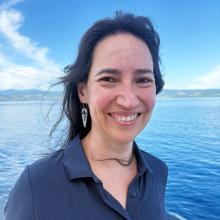
Luisa Dueñas
Tell us about your work/research. What kinds of things do you do?
Since 2019, I have served as a professor at the Universidad Nacional de Colombia, Bogotá. My research focuses on evolutionary processes in deep-sea benthic ecosystems, particularly on understanding the drivers of diversification and the mechanisms that maintain diversity and population structure over time. My broader interests include marine ecology, molecular biology, systematics, conservation, phylogeography, and phylogenomics.
My work spans a wide range of ecosystems and disciplines. I have conducted research on shallow and mesophotic coral reef ecology and connectivity, coral recruitment dynamics, deep-sea octocoral taxonomy and systematics, and phylogeographic patterns of deep-sea octocorals in the Pacific and Southern Oceans (including Antarctica). I have also contributed to biodiversity baseline surveys and long-term monitoring programs for both shallow and deep-water ecosystems in Colombia’s oceanic and continental regions, supporting conservation and management efforts. For over a decade, I have actively collaborated with national and international institutions to advance initiatives aimed at exploring and understanding Colombia’s deep-sea environments.
What sparked your initial interest in your career?
I've always been good at natural sciences. Since I was little, I've loved nature and being outdoors. But growing up in Bogotá, in the mountainous region of Colombia, my interest in the sea grew.
Colombia has two coasts and nearly 50% of its territory is marine. During my undergraduate studies, it became clear that knowledge of the sea focuses on the shallow areas, close to the coast. And I always wanted to know what else lives in the distant, deep-sea areas.
Who influenced you or encouraged you the most?
My family. Science runs in the family with geologists, marine biologist, vulcanologist. And, my whole family has always been very supportive, even if they don't understand exactly what I do hahaha.
What element of your work/study do you think is the most fascinating?
Going to places where no one has gone and the potential to find new species is what I find most fascinating.
How did you get involved with the Ocean Exploration Trust?
The first time I sailed on the Nautilus was in 2011 as a doctoral student. It was an incredible experience in the Mediterranean Sea.
I recently saw an invitation from Ocean Census to submit an expression of interest to participate in the expedition aboard the Nautilus. Thanks to Ocean Census and Ocean Exploration Trust, I have a new opportunity to be part of the team aboard the Nautilus.
What other jobs led you to your current career?
My work has always been associated with academic life. During my MSc and PhD studies I had the opportunity to complete several short internships in the invertebrate collections at NIWA (Wellington, New Zealand), CSIRO (Hobart, Australia) and NMNH Smithsonian (Washington DC, USA).
I have participated in several shallow-water and mesophotic expeditions, exploring reefs in the Colombian Caribbean, and deep-water expeditions in the Gulf of Mexico and the Mediterranean; most recently, a deep-water expedition in the Colombian Pacific (NatGeo Pristine Seas 2022).
I also completed a postdoctoral fellowship with Anadarko Colombia Company, where I investigated the biodiversity of deep-sea organisms in the Colombian Caribbean in the context of offshore oil and gas exploration.
What are your degrees and certifications?
BSc in Biology – Pontificia Universidad Javeriana (Colombia)
MSc in Biological Sciences – Universidad de los Andes (Colombia)
PhD in Biological Sciences /Dr.rer.nat dual Doctoral Program – Universidad de los Andes (Colombia) /Justus Liebig Universitat Giessen (Germany)
What are your hobbies?
I love reading historical or science fiction novels; it's my way of unwinding from work. I've never been good at drawing, but I really enjoy coloring. I also love to go dancing.
What advice would you give someone who wants to have a career like yours?
Being a scientist means constantly learning; you never stop learning. And there's nothing better than being able to pass on the knowledge you've acquired to society or to the next generation of scientists. But not everything is perfect. Doing science is difficult, and it requires courage to avoid giving in to frustration. It's important never to compare your scientific journey with that of others. We all follow different paths at different times, in different parts of the world, and with unequal opportunities. We must do the best with what we have.
Surrounding yourself with peers who are willing to share their knowledge and give back in kind is the best way to build scientific networks and maintain them over time.
Expeditions
Luisa participated in the following Ocean Exploration Trust expeditions:
